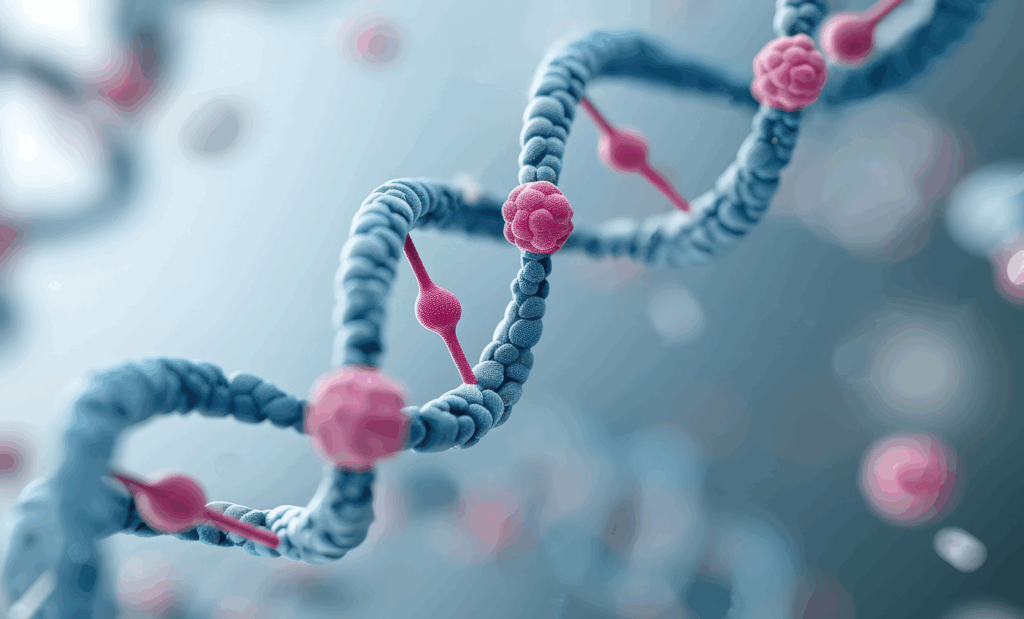Millions of women worldwide are impacted by breast cancer. About 5-10% of cases are thought to be hereditary, meaning that genetic mutations are passed down from parent to child. Understanding genetic risk can be helpful in breast cancer prevention and early detection.
Understanding genetic mutation and breast cancer risk
Think of genes as a blueprint for your body. Sometimes, there are typos in this blueprint that can increase your risk of breast cancer.
“The most well-known genetic mutations linked to breast cancer are the BRCA1 and BRCA2 genes,” says Abhishek Seth, MD, a cancer care specialist at Mount Nittany Health. “When these gene mutations are present, there is a 72% lifetime risk of developing breast cancer, where the average risk is about 12%.”
The BRCA1/2 mutations aren’t the only genetic factors at play. There’s a whole cast of genetic characters that can raise your risk. Other genes associated with increased breast cancer risk include:
- High-risk genes: PALB2, PTEN, TP53
- Moderate to high-risk genes: ATM, CDH1
- Moderate-risk genes: CHEK2, NBN, NF1, STK11
Some of these mutations can also be associated with other types of cancer and carry different levels of risk for breast cancer.
Who should consider genetic testing?
So, how do you know if genetic testing is right for you? While it may seem like a good idea to be tested, genetic testing isn’t for everyone. The National Comprehensive Cancer Network (NCCN) suggests genetic testing for individuals who meet specific criteria:
- Personal history of breast cancer diagnosed at age 50 or younger: Women who are diagnosed with breast cancer at a younger age are more likely to have a genetic predisposition.
- Triple-negative breast cancer diagnosed at any age: Triple-negative breast cancers (estrogen receptor-negative, progesterone receptor-negative and HER2-negative) are more common in women with BRCA1 mutations. “This type of cancer lacks targeted therapies, meaning genetic testing is important for risk assessment and management of disease,” says Dr. Seth.
- Two or more primary breast cancers: When women have been diagnosed with breast cancer more than once, there is a higher likelihood of a genetic mutation.
- Male breast cancer: Breast cancer is rare in men. When it does occur, it’s more likely to be associated with the BRCA2 gene mutation.
- Ashkenazi Jewish heritage: People of Ashkenazi Jewish descent have a higher occurrence of BRCA1 and BRCA2 mutations. About 1 in 40 will have a mutation compared to about 1 in 400 in the general population.
- Family history of breast cancer at a young age, ovarian cancer, male breast cancer, pancreatic cancer or metastatic prostate cancer: A strong family history of these cancers can indicate a hereditary cancer syndrome. For example:
- Breast cancer in close relatives (mother, sister, daughter) before age 50
- Ovarian cancer at any age (strongly associated with BRCA mutations)
- Male breast cancer in the family (often linked to BRCA2 mutations)
- Pancreatic cancer (can be associated with BRCA2 mutations)
- Metastatic prostate cancer (more common in men with BRCA mutations)
Having one or more of these factors in your personal or family history doesn’t guarantee you have a genetic mutation. However, it does suggest that genetic testing could provide valuable information about your cancer risk.
“Your healthcare provider or a genetic counselor can guide you through determining if you meet the testing criteria,” says Dr. Seth.
The genetic testing process and understanding the results
Now, let’s talk about what happens if you decide to get tested. Genetic testing is simple and requires a blood or saliva sample. Testing must be done in a clinically-approved laboratory. Before testing, a genetic counselor can explain the process, potential results and the implications of those results.
Genetic test results can be positive, meaning a known harmful mutation exists. If no known harmful mutation is found, the result will be negative. A variant of uncertain significance (VUS) is a gene found, but its impact on cancer is unknown.
“A positive result doesn’t guarantee you’ll develop cancer; a negative result doesn’t mean you won’t. A positive result can be scary, but it’s also empowering,” says Dr. Seth. “It allows you to take control of your health in a way you never could before.”
If the results are positive, you are considered high-risk, and several options are available:
- Enhanced screening: More frequent mammograms, breast MRIs and clinical breast exams starting at a younger age.
- Risk-reducing medications: Drugs like tamoxifen or aromatase inhibitors can lower breast cancer risk in some high-risk women.
- Preventive surgery: Some women choose to have prophylactic mastectomy (removal of healthy breasts) or oophorectomy (removal of ovaries) to reduce their cancer risk significantly.
- Lifestyle modifications: Maintaining a healthy weight, regular exercise, limiting alcohol and not smoking can help reduce breast cancer risk.
Genetic testing is a personal choice and can provide valuable insight into your health and medical decisions. When you understand genetic risk, you are better positioned to take proactive steps toward prevention and early detection.
Cancer Care
Discover more about Cancer Care, including locations and providers, at Mount Nittany Health



